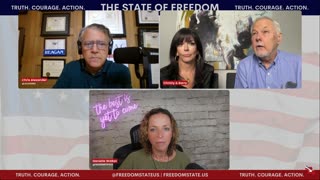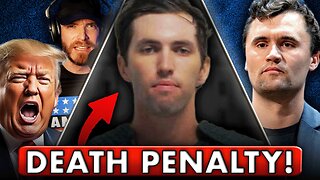Premium Only Content

It Doesn't Pay to Cheat Medicare
When Medicare Errs The Vendor Must Fulfill Administrative Remedies
Post 5193
Pain Care Providers Services to Medicare are not Unlimited
In the People Of The State Of California ex rel. San Diego Comprehensive Pain Management Center, Inc. v. Jaysen Eisengrein and Sandra Love, No. 24-cv-01481-BAS-BJC, United States District Court, S.D. California (September 17, 2025) Defendants Jaysen Eisengrein and Sandra Love's (“Defendants”) moved the USDC to Dismiss Plaintiff San Diego Comprehensive Pain Management Center, Inc.'s (“SDCPMC” or “Plaintiff”) Complaint.
Plaintiff is a medical provider located in San Diego County that treats Medicare beneficiaries with chronic pain, and this is the third action stemming from a suspension of its Medicare payments. Previously the USDC dismissed Plaintiff's suit for lack of subject matter jurisdiction because it did not show that it had exhausted administrative remedies or show that the exhaustion requirement should be judicially waived.
BACKGROUND
Administrative Remedies
Although providers cannot appeal a temporary payment suspension, a suspension “may culminate in an appealable determination . . . if [reimbursement] claims are subsequently denied.” Before filing suit in court, a Medicare beneficiary must proceed through five levels of administrative review, described in regulations issued by the controlling agency, CMS, as follows:
an initial determination by the Medicare administrative contractor;
a redetermination by the Medicare administrative contractor;
reconsideration by a qualified independent contractor;
a hearing before an administrative law judge . . .; and
review by the Medicare Appeals Council.
If the beneficiary is dissatisfied with the Appeals Council's decision, he or she may then seek judicial review.
The Prior Actions
In late 2021, Plaintiff and two related medical practices sued, among others, HHS and Qlarant Integrity Solutions, LLC (“Qlarant”) to remove the suspension and receive payments for their outstanding claims. The Court analyzed whether waiving the exhaustion requirement was appropriate and found waiver was not warranted. The Court consequently dismissed Plaintiffs' action in SDCPMC I and SDCPMC II for lack of subject matter jurisdiction.
The Present Action
Ultimately, Plaintiff's Complaint in this present action is nearly identical to its Complaint in SDCPMC II.
MOTION TO DISMISS
Defendants move to dismiss pursuant to Rule 12(b)(1) because this ground is decisive.
Defendants Mount Facial and Factual Challenges to Subject Matter Jurisdiction
As a threshold matter, the Court concluded that Defendants' motion presents both a facial and a factual attack to subject matter jurisdiction. Defendants mount a factual attack. The Court recognizes that Defendants have raised a factual attack on subject matter jurisdiction.
Plaintiff's Complaint Recycles Allegations from SDCPMC II
First and foremost the subject matter jurisdiction analysis conducted in SDCPMC II does not change simply because Plaintiff now alleges that Medicare has terminated the suspension of payments in effect at the time.
Plaintiff may not seek judicial review without first obtaining a final agency decision subject to administrative appeal, and failure to exhaust one's administrative remedies deprives federal courts of subject matter jurisdiction over claims arising under the Medicare Act. Plaintiff cannot circumvent this Court's prior ruling by characterizing the termination of a payment suspension as a final agency decision.
The Court granted Defendants' Rule 12(b)(1) motion due to the plaintiff's failure to establish subject matter jurisdiction. The court emphasized that even if diversity jurisdiction could be established, the Medicare Act's provisions would still preclude subject matter jurisdiction without a final decision issued by the Secretary. Consequently, the case was dismissed without prejudice.
ZALMA OPINION
Health care providers who improperly bill Medicare find CMS refuses to pay their claims for payment for services to Medicare patients. The law allows - indeed - requires that the provider seek administrative remedies before they can sue. The Defendants - health care providers - attempted three time to circumvent the need to fulfill administrative remedies only to find their attempts failed and the USDC dismissing their attempt three time by attempting recycle previous litigation. It didn't work.
(
c) 2025 Barry Zalma & ClaimSchool, Inc.
Please tell your friends and colleagues about this blog and the videos and let them subscribe to the blog and the videos.
Subscribe to my substack at https://barryzalma.substack.com/subscribe
Go to X @bzalma; Go to Barry Zalma videos at Rumble.com at https://rumble.com/account/content?type=all; Go to Barry Zalma on YouTube- https://www.youtube.com/channel/UCysiZklEtxZsSF9DfC0Expg; Go to the Insurance Claims Library – https://lnkd.in/gwEYk.
-
 7:39
7:39
Insurance Law
12 days agoAllstate Fights Fraudsters in Court and Wins
231 -
 1:01:24
1:01:24
VINCE
2 hours agoDemocrats Can't Keep This Sex Criminal Locked Up | Episode 136 - 09/30/25
61.6K93 -
 LIVE
LIVE
Badlands Media
7 hours agoBadlands Daily: September 30, 2025
3,846 watching -
 LIVE
LIVE
The Big Mig™
2 hours agoPeace In The Middle East Or War?
4,515 watching -
 LIVE
LIVE
The State of Freedom
3 hours ago#337 What’s Behind the LA GOP Dysfunction? Insiders, Denialists & Deplorables
1,138 watching -
 1:42:59
1:42:59
Dear America
2 hours agoCharlie’s Killer Fights For NO DEATH PENALTY!! NOT HAPPENING!! + Gov Shutdown Imminent!!
98.7K82 -
 2:47:35
2:47:35
Right Side Broadcasting Network
4 hours agoLIVE REPLAY: President Trump and Pete Hegseth Address Military Leaders at Quantico - 9/30/25
61K88 -
 1:32:46
1:32:46
The White House
2 hours agoPresident Trump Delivers Remarks to the Department of War
18.8K8 -
 LIVE
LIVE
Law&Crime
1 hour agoLIVE: Gun-Cleaning Gone Deadly Trial – FL v. Leslie Boileau – Day 1
69 watching -
 LIVE
LIVE
Nikko Ortiz
2 hours agoShotguns Only? - Rumble LIVE
121 watching